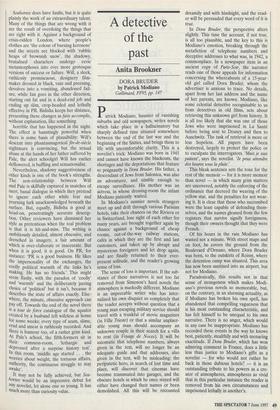A detective of the past
Anita Brookner
DORA BRUDER by Patrick Modiano Gallimard, FF95, pp. 147 Patrick Modiano, haunter of vanishing suburbs and old newspapers, writes novels which take place in a hallucinatory but sharply defined time situated somewhere between the end of the last war and the beginning of the Sixties, and brings them to life with uncomfortable clarity. This is a novelist's trick: Modiano was born in 1945 and cannot have known the blackouts, the shortages and the deportations that feature so poignantly in Dora Bruder. His father, a descendant of Jews from Salonica, was also an adventurer, and nimble enough to escape surveillance. His mother was an actress, in whose dressing-room the infant Modiano patiently waited. In Modiano's sunnier novels strangers meet up and drift through various Parisian hotels, take their chances on the Riviera or in Switzerland, lose sight of each other for many years, are brought together again by chance against a background of cheap rooms, out-of-the-way railway stations, cafés in which they are the first and last customers, and taken up by abrupt and mysterious foreigners and let drop again, and are finally returned to their ever- present solitude, and the reader's growing sense of loss.
The sense of loss is important. If the sub- stance of these narratives is not too far removed from Simenon's hard novels the atmosphere is markedly different. Modiano is an impeccable writer who has inter- nalised his own disquiet so completely that the reader accepts without question that a young man escaping military service should travel with a trunkful of movie magazines (in Villa Trieste) or that a similar unplace- able young man should accompany an unknown couple in their search for a villa to rent (in Voyage de Noces). It will be axiomatic that telephone numbers, always given in the text, will no longer be an adequate guide and that addresses, also given in the text, will be misleading: the peripatetic hero, in search of lost time and place, will discover that cinemas have become transmuted into garages, and the obscure hotels in which he once stayed will either have changed their names or been demolished. All this will be recounted dreamily and with hindsight, and the read- er will be persuaded that every word of it is true.
In Dora Bruder, the perspective alters slightly. This time the account, if not true, is all too plausible, and the key to this is Modiano's emotion, breaking through the metafiction of telephone numbers and deceptive addresses to what was, in 1942, a commonplace. In a newspaper item in an ancient copy of Paris-Soir, the narrator reads one of those appeals for information concerning the whereabouts of a 15-year- old girl called Dora Bruder, whom the advertiser is anxious to trace. No details, apart from her last address and the name of her parents, are known. Modiano, like some celestial detective recognisable to us from detectives in old films, sets about retrieving this unknown girl from history. It is all too likely that she was one of those Jews who were imprisoned in La Sante before being sent to Drancy and then to Auschwitz. The task of retrieval is more or less hopeless. All papers have been destroyed, largely to protect the police or to exculpate the interrogators. 'Math je suis patient', says the novelist. Ve peux attendre des heures sous la pluie.'
This bleak sentence sets the tone for the rest of the memoir — for it is more memoir than novel — in which many grim matters are uncovered, notably the enforcing of the ordinance that decreed the wearing of the yellow star, and the penalties for not wear- ing it. It is clear that those who succumbed were the least capable of defending them- selves, and the names gleaned from the few registers that survive signify foreignness, though their owners thought that they were French.
Of his hours in the rain Modiano has wasted not a minute. With street maps and on foot, he covers the ground from the Boulevard d'Omano, where Dora Bruder was born, to the outskirts of Roissy, where the detention camp was situated. This area has now been sanitised into an airport, but not for Modiano.
Paradoxically, this results not in that sense of strangeness which makes Modi- ano's previous novels so memorable, but, on the contrary, in an alarming actuality, as if Modiano has broken his own spell, has abandoned that compelling vagueness that is his most outstanding characteristic, and has felt himself to be unequal to his own narrative. There is no anger, which would in any case be inappropriate. Modiano has recorded these events in the way he knows best, patiently, stealthily and with menacing exactitude. If Dora Bruder, which has won admiring comment in France, does a little less than justice to Modiano's gifts as a novelist — for who would not rather be back in those dubious hotels? — it is an outstanding tribute to his powers as a cre- ator of atmospheres, atmospheres so vivid that in this particular instance the reader is removed from his own circumstances and imprisoned lethally in another's.










































































 Previous page
Previous page